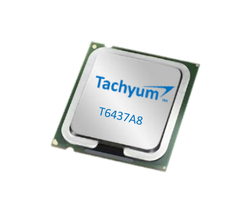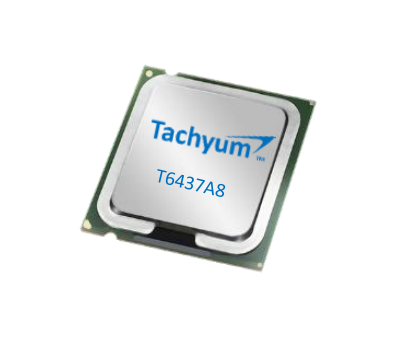
May 21, 2018
By: Michael Feldman
Tachyum, a Silicon Valley startup has unveiled a new processor that the company says can tackle a broad range of workloads in HPC, data analytics, artificial intelligence, and web services, while using a fraction of the power of existing chips.
 In fact, the company claims that the new chip, known as “Prodigy,” can deliver ten times the performance per watt of conventional processors across these application domains. And supposedly it will be able to do so in as little as 1 percent of the datacenter space. As a result, Tachyum predicts Prodigy will be able to reduce datacenter costs by a factor of four.
In fact, the company claims that the new chip, known as “Prodigy,” can deliver ten times the performance per watt of conventional processors across these application domains. And supposedly it will be able to do so in as little as 1 percent of the datacenter space. As a result, Tachyum predicts Prodigy will be able to reduce datacenter costs by a factor of four.
The performance-per-watt story is a bit subtler than that, however. What the company is actually promising is computational power and efficiency on par with that of GPUs, but with a programming model that more closely resembles that of a CPU. Tachyum overall pitch is that Prodigy is a universal processor that can handle compute-intensive task like those found in HPC and machine learning, as well as more mainstream datacenter workloads, such as web services and analytics. And it can do so more efficiently than any of its competition.
According to Tachyum co-founder and CEO Radoslav 'Rado' Danilak, the energy efficiency of the chip and the financial benefits that accrue from is key to Prodigy’s value proposition. The example he uses to illustrate the importance of this efficiency is Google. “They spent more than 10 billion dollars last year on the datacenter,” he said recently. “With our technology they can easily save 6 billion, potentially 7 billion dollars, every year.”
All of this is being accomplished without customized circuitry for specific applications. "Rather than build separate infrastructures for AI, HPC and conventional compute, the Prodigy chip will deliver all within one unified simplified environment, so for example AI or HPC algorithms can run while a machine is otherwise idle or underutilized," said Danilak. "Instead of supercomputers with a price tag in the hundreds of millions, Tachyum will make it possible to empower hyperscale datacenters to produce more work in a radically more efficient and powerful format, at a lower cost."
Even though the company is aiming Prodigy at a broad swathe of datacenter applications, it seems to be particularly focused on the burgeoning AI space, claiming that the processor’s general-purpose nature will give it an advantage in tackling the various computational models being used in that domain. Tachyum is also pitching the chip as “an ideal tool” for the Human Brain Project. That effort is expected to require something on the order of 10 exaflops in order to support a real-time simulation of human brain. The company estimates it will take about 256 thousand of its processors to accomplish this feat. The implication is that such a machine can be built by 2020.
According to Danilak, Prodigy’s power efficiency and computational density will also make it suitable for powering containerized datacenters. The advantage here is that these containers can be located in the midst of large population centers, such that latency-sensitive applications like virtual reality-based gaming could be practical. Danilak also thinks that the chip could be employed in edge computing environment, like for example, cell phone towers, where they could be used by telcos to deliver novel types of media services.
Not a whole lot has been revealed about the specifics of Prodigy’s design. In presentations, Danilak has outlined the architecture in general terms, noting that it will support some number of 100 Gbps Gigabit Ethernet and PCIe ports, as well as the capability for flash storage processing. From an instruction perspective it will have data path for things like AI and a universal control path for more general computation. That suggests they have found some way to combine the data parallelism of a GPU with the scalar model of a conventional CPU.
But the real critical piece of technology appears to be related to a solution of the “the wire problem” – the divergence between transistor speeds and the wires that feed them. As transistors get smaller the wires connecting them must get smaller as well, which slows down their transmission speed, hindering overall performance. The company has apparently attacked this problem at a fundamental level by changing the wire model. In a video recorded last year, Danilak says they have devised an architecture where the wires become “incredibly short,” which gets around the problem by making wire speed “almost irrelevant.”
At this point, Tachyum’s business strategy is unknown. Even though the chip is now officially unveiled, the company has yet to announce system partners or early customer trials. The release date for Prodigy is also still up in the air. That said, if even half of these claims prove to be true, Tachyum could easily get acquired before the first chip leaves the fab. There is certainly no shortage of computer companies that would be interested in such technology.
